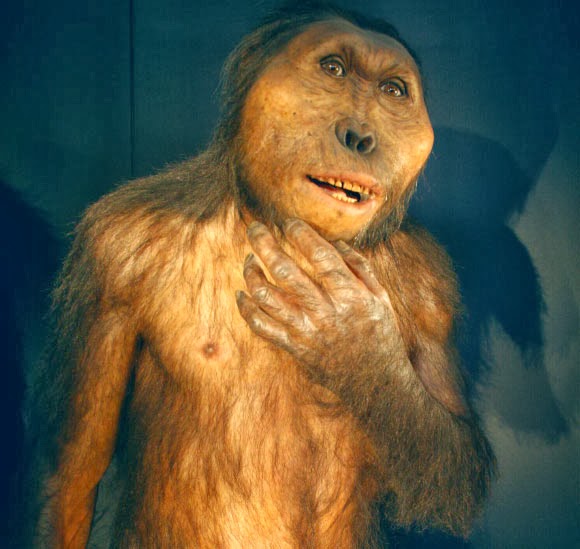Oh yes.
Damn dirty apes. Why do humans have such a complicated relationship with them? We love them and fear them, for they represent our shadow side.
I just finished a post speculating on a theoretical and long-discussed human/chimp hybrid species called a "humanzee". The more I explored this topic, the queasier I got, because it just seems so bloody obvious to me that this is something that
could be done: in which case, if it hasn't been done by now, it
will be.
I watched a snippet on YouTube in which a primatologist insisted that there would never be a human/chimp hybrid, "not in the wild anyway", unless some "mad scientist" put one together, "and no one would ever fund such a project."
Indeed. My feeling is that she overestimates human morality and underestimates human greed.
I think that when faced with this ghastly possibility, denial is the usual response. Oh, surely not! It
couldn't happen, could it? But with more and more disparate creatures being smashed together any-old-how, creatures with grotesque and demeaning names like liger and pizzly and wolphin, this potential horror becomes more possible and even more likely with every passing day. We seem to love to step into the God role and create brand new species, but as Mary Shelley tried to warn us, such hubris can be fatal.
It's a common belief that "we evolved from chimpanzees", and because I possess a little knowledge (which is always a dangerous thing) from taking anthropology courses, I know this isn't the case. Humans and chimps had a common ancestor in such remote antiquity that it's hard to pin down exactly where, when and what. (The name
ramepithecus springs out at me for some reason, but as with so much in this field, new information is constantly cancelling the old). At some point, a single species of primitive ape branched.
Why it branched is anyone's guess. Why we continued to evolve into humans (though I sometimes believe we are
devolving) is a mystery.
It's all a little grotesque. This ape-creature branches off, begins to walk upright (for bipedalism came long before the brain developed significantly), but remains incredibly primitive for uncounted millennia. The variations of proto-humans form a dense branching tangle which is hard to sort out, with numerous evolutionary dead ends. But accurate reconstruction of faces is now possible from the skulls anthropologists have collected in the field.
These are not just eerie: they should contain a warning.
The following pictures may be disturbing to some viewers.
It's that squeamish combination of ape and human: and in this case, literally so. The australopithecines (given that strange and bulky name for reasons that confound me) roamed around and grunted and hunted and reproduced in so many different forms that it's hard to keep track of them all. Their big hairy faces and tiny skulls have disturbing human attributes, the mouth a little different (which made it possible for us to speak, along with a larynx set lower in the throat), and the eyes - well, I don't need to tell you about the eyes.
If we take a close look at these reconstructions, might we get a glimpse of what a humanzee might look like? This would resemble the "backbreeding" experiments the Nazis undertook during World War II, in which they tried to resurrect extinct species through selective breeding (with, as far as I know, no success. . .but hey, there's always room for another conspiracy theory). If there were some way to fuse together and reunite the two species that split so long ago, might an australopithicine suddenly spring out at us again after thousands and thousands of years of extinction?
Well, what do you think? All I can tell you is. . .
If this guy knocks, don't answer the door. He's no Jehovah's Witness.
I think this is the origin of the term "lowbrow". Don't let him in either, not even to use the bathroom.
The gangsta humanzee (IQ about the same as a human one). Outfit by House of Capone.
The Indiana Jones of the hybrid set.
Wuzzup?
This fellow's a charmer. A sort of hybrid Maurice Chevalier.
Looks a little like E.T. But why so sad? In another 200,000 years or so, he'll be
destroying the planet.
All I can say about this one is: RUN!!!!!

.jpg)



































